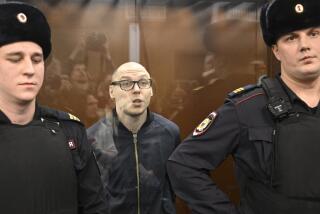Bulat Okudzhava; Russian Poet, Singer
- Share via
PARIS — Bulat Okudzhava, a prominent Russian poet, writer, folk singer and bard who was a hero to many Soviet liberals in the 1960s, has died. He was 73.
Okudzhava died Thursday evening at a military hospital in the Paris suburb of Clamart during a trip to France.
The poet had undergone a number of heart bypass surgeries in the United States. His first occurred at St. Vincent Medical Center in Los Angeles in 1991 after he became ill while performing for Russian emigres in Hollywood. Unprepared for the $56,000 medical bill, Okudzhava expressed his gratitude to Californians and other Americans after spontaneous donors raised the money.
His wife, Olga, told Russia’s ITAR-Tass news agency Friday that Okudzhava had fallen ill about a week ago with the flu, and that serious complications resulted three or four days later.
She said that among the problems was severe stress from being alone in a foreign country where he didn’t speak the language.
“Bulat felt very alone in this strange atmosphere, among strangers. More than anything in the world, he would have liked to have died in Moscow,” she said.
Okudzhava gained widespread popularity within Russia in the 1960s as a singer and guitarist who was among the first to perform poetic compositions with messages perceived as dissident--even though the lyrics dealt with love or such simple things as the last trolley home.
The messages were so well concealed that Soviet authorities never treated Okudzhava as a political dissident.
Listeners who vividly recalled Joseph Stalin found him in the song about a black cat that terrorizes its neighbors, “hiding his smile behind a mustache.” Pacifist overtones in other songs contrasted with the official endorsement of the military.
Okudzhava’s dissident image was enforced by later novels--grotesque tales of 19th century Russian revolutionaries and writers hunted down by the czarist secret service.
The writer was born May 9, 1924, in Moscow. His father was a Communist Party functionary who was ordered shot under Stalin’s repressions in 1937. His mother was arrested the same year and spent a decade in labor camps.
After studying linguistics at Tbilisi University in Georgia, Okudzhava volunteered to fight the German army in 1942.
After the war, he worked as a teacher at an agricultural school, as a journalist and at a publishing firm before focusing full time on his writing and music.
Soviet critics attacked his autobiographical anti-war novel of 1961, “Be Well, Schoolboy,” complaining of the “infantile psychology of the hero.”
Okudzhava remained a leading figure in Russian intellectual circles to the end of his life. He had come to France on a private visit.
Last year, he was among intellectuals who reluctantly backed President Boris Yeltsin for reelection despite major misgivings because of the bloody war in breakaway Chechnya. Like others, he was fearful of the Communists returning to power.
More to Read
Sign up for Essential California
The most important California stories and recommendations in your inbox every morning.
You may occasionally receive promotional content from the Los Angeles Times.









